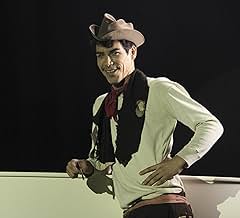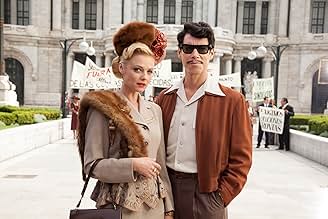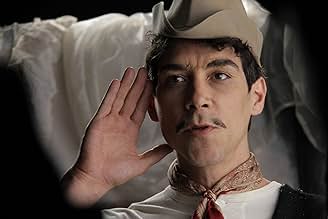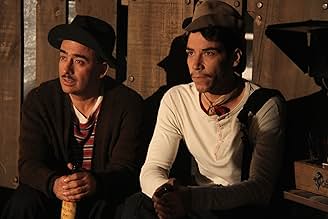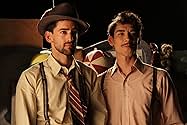IMDb RATING
6.6/10
4.3K
YOUR RATING
The untold story of Mexico's greatest and most beloved comedy film star of all time, from his humble origins on the small stage to the bright lights of Hollywood.The untold story of Mexico's greatest and most beloved comedy film star of all time, from his humble origins on the small stage to the bright lights of Hollywood.The untold story of Mexico's greatest and most beloved comedy film star of all time, from his humble origins on the small stage to the bright lights of Hollywood.
- Awards
- 30 wins & 11 nominations total
Arantza Muñoz
- Bailarina
- (as Aranzta Muñoz)
Armando Vega Gil
- Músico Salón
- (as Armando Vega-Gil)
- Director
- Writers
- All cast & crew
- Production, box office & more at IMDbPro
Featured review
Cantinflas (2014) should have been a clever little gem about a piece of forgotten film history but ends up being a solidly boring mish-mesh of a film that did little justice to its subject matter. In it Cantinflas aka Mario Moreno (Oscar Jaenada) works his way up from a minor vaudeville player on the streets of Mexico City to one of the most beloved Mexican actor/comedians of all time.
He does so while a second, mostly English tale unfolds. Michael Todd (Michael Imperioli) a wily producer at United Artists is trying to cobble together the 1956 theatrical version of Around the World in 80 Days. He boasts to the studio exec that he can convince over forty international film stars to be in the film but in reality he barely has Elizabeth Taylor on the hook. In an attempt to make the film salvageable he asks the ever-popular Cantinflas to make a cameo appearance.
Despite polished period detail and some worthwhile performances, Cantinflas feels cheap and more than a bit off. The cinematography colludes into a mix of flat browns and grays and everyone seems to be spotted by florescent lights. One cannot help but wonder if this story was given to a more mature director we'd be able to see and enjoy the vibrant colors of Mexico and the luster of old Hollywood.
The film is also betrayed by a script that fails to staple the important moments or rather the two largest threads into a story of urgency. The turbulent labor politics of Moreno's time get the same compromised treatment as his early roving theatre career. His height of popularity is as deflated as the 80 Days subplot. It's as if the editors lost a few key scenes on the cutting room floor and pasted half-shot scenes together hoping the audience wouldn't notice.
There's one nearly-poignant scene where Cantinflas, in a "success is ruination"-type stupor sees a note of encouragement by none other than Charlie Chaplin. Again I say near-poignant because up until that moment we never knew Chaplin's opinion was important to Cantinflas. Goaded by the letter, once Cantinflas agrees to do Around the World in 80 Days it leaves him without catharsis or character change. His wife seemed to think fame was going to his head so appearing in the film he's most internationally recognized for wouldn't have solved that dispute; yet it did.
Cantinflas attempts to create a stereotypical biographical film out of a figure that, given the events of the film, deserved better. At best this film deserves to be on cable and given a Hallmark type release, not a theatrical one. Maybe in the decades to come people will honor his contribution to his nation's cinema with a movie that immortalizes the man properly. Now that would be the rub.
http://www.theyservepopcorninhell.blogspot.com
He does so while a second, mostly English tale unfolds. Michael Todd (Michael Imperioli) a wily producer at United Artists is trying to cobble together the 1956 theatrical version of Around the World in 80 Days. He boasts to the studio exec that he can convince over forty international film stars to be in the film but in reality he barely has Elizabeth Taylor on the hook. In an attempt to make the film salvageable he asks the ever-popular Cantinflas to make a cameo appearance.
Despite polished period detail and some worthwhile performances, Cantinflas feels cheap and more than a bit off. The cinematography colludes into a mix of flat browns and grays and everyone seems to be spotted by florescent lights. One cannot help but wonder if this story was given to a more mature director we'd be able to see and enjoy the vibrant colors of Mexico and the luster of old Hollywood.
The film is also betrayed by a script that fails to staple the important moments or rather the two largest threads into a story of urgency. The turbulent labor politics of Moreno's time get the same compromised treatment as his early roving theatre career. His height of popularity is as deflated as the 80 Days subplot. It's as if the editors lost a few key scenes on the cutting room floor and pasted half-shot scenes together hoping the audience wouldn't notice.
There's one nearly-poignant scene where Cantinflas, in a "success is ruination"-type stupor sees a note of encouragement by none other than Charlie Chaplin. Again I say near-poignant because up until that moment we never knew Chaplin's opinion was important to Cantinflas. Goaded by the letter, once Cantinflas agrees to do Around the World in 80 Days it leaves him without catharsis or character change. His wife seemed to think fame was going to his head so appearing in the film he's most internationally recognized for wouldn't have solved that dispute; yet it did.
Cantinflas attempts to create a stereotypical biographical film out of a figure that, given the events of the film, deserved better. At best this film deserves to be on cable and given a Hallmark type release, not a theatrical one. Maybe in the decades to come people will honor his contribution to his nation's cinema with a movie that immortalizes the man properly. Now that would be the rub.
http://www.theyservepopcorninhell.blogspot.com
- bkrauser-81-311064
- Sep 20, 2014
- Permalink
Storyline
Did you know
- TriviaOfficial submission of Mexico to the best foreign language film category of the 87th Academy Awards 2015.
- GoofsThe scene of shooting "Ahí está el detalle" (1940) begins with a title card indicating that filming takes place at Churubusco Studios. Churubusco facilities weren't opened until 1945. In fact, filming took place at CLASA Studios.
- Crazy creditsWhile the credits role one of the most famous scenes of the film El bolero de Raquel is recreated by the actors in the film.
- ConnectionsFeatures Le Voyage dans la Lune (1902)
- SoundtracksScore 01/ Original Soundtrack - Cantinflas: Música Original De La Película
Composed by Roque Baños (as Roque Baños López)
Universal / Universal Music Latino / Vene
- How long is Cantinflas?Powered by Alexa
Details
- Release date
- Country of origin
- Languages
- Also known as
- 캔틴플라스
- Filming locations
- Teatro de la Ciudad, Mexico City, Mexico(Where Cantinflas and his friends go to a show early in the film.)
- Production company
- See more company credits at IMDbPro
Box office
- Budget
- $3,000,000 (estimated)
- Gross US & Canada
- $6,382,924
- Opening weekend US & Canada
- $2,661,253
- Aug 31, 2014
- Gross worldwide
- $17,998,703
- Runtime1 hour 42 minutes
- Color
Contribute to this page
Suggest an edit or add missing content


![Watch Tráiler [OV]](https://m.media-amazon.com/images/M/MV5BMDJhMDMxOTYtODA3MS00YTQzLWEyODctM2M1Y2FiZjI5YjBkXkEyXkFqcGdeQXRodW1ibmFpbC1pbml0aWFsaXplcg@@._V1_QL75_UX500_CR0)




















